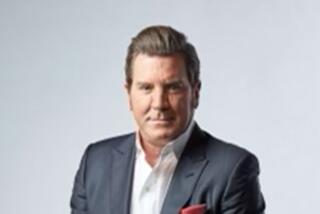President of TV Indecency Watchdog Group to Step Down
- Share via
WASHINGTON — L. Brent Bozell, the conservative activist who launched thousands of indecency complaints against broadcasters, announced Friday that he would step down as president of the Parents Television Council, but vowed to continue fighting to clean up America’s airwaves.
Although he complained that there was still too much offensive content on TV, Bozell said his group has had a major effect since he founded it more than a decade ago.
“Had we not been active, Lord knows where television would be today,” he said. “I’m convinced we would have full nudity by now.”
Bozell will remain on the group’s board and continue to be an advisor after he gives up running day-to-day operations Jan. 1. His successor will be PTC Executive Director Tim Winter, who worked for NBC for 15 years and wants to find ways to collaborate with the TV industry.
“That doesn’t mean we’re going to lower our standards ... but I think there are many more things we can do to work together,” Winter said. He noted that the group already offers its “seal of approval” for family-friendly shows.
Network executives did not want to speak publicly about Bozell, who has been a major irritant to the TV industry over the years. One executive who requested anonymity said collaboration would be difficult given the adversarial approach the group has taken. It has filed thousands of electronic complaints with federal regulators and urged companies not to advertise on certain shows.
The Parents Television Council began as an offshoot of Bozell’s Media Research Center, a Virginia-based group that monitors the media for what it sees as liberal bias. As the PTC grew to more than a million members, Bozell said he could no longer run both groups.
Bozell, 51, who has five children aged 9 to 28 and lives in Virginia, said he chose to give up PTC, which is headquartered in Los Angeles.
“I appreciate the frequent flier mileage, but something just had to give,” he said.
The nephew of conservative icon William F. Buckley Jr., Bozell has appeared frequently on TV talk shows to criticize network programming.
He seized on Janet Jackson’s “wardrobe malfunction” during CBS’ telecast of the 2004 Super Bowl halftime show and other incidents to press federal regulators to crack down on indecency and persuade Congress to increase maximum fines tenfold.
“He’s probably made people think more seriously about television than almost anybody else,” said Douglas Gomery, resident scholar at the Library of American Broadcasting at the University of Maryland.
Bozell is just one in a line of activists who over the years have tried to reverse societal changes by attacking the entertainment industry, Gomery said.
“Culture is changing and they’re trying to hold up what they think are past standards,” he said. “It just never works.”
Bozell said he had seen some improvement in TV programming, but the offenders were worse than ever.
“I think some people in Hollywood are really working to produce much better material,” Bozell said. “Some people are working overtime to be as offensive as they can.”
By offering an automated form on its website, the PTC has helped flood the Federal Communications Commission with complaints about TV and radio broadcasts in recent years.
In 2000, the FCC received just 111 complaints that resulted in $48,000 in fines. By 2004, the FCC had received 1.4 million complaints resulting in $7.9 million in fines. The numbers have decreased since then, to 233,531 complaints in 2005. In the first three months of this year, the FCC received 275,131 complaints.
The repercussions were felt in Congress. In June, lawmakers voted to increase the maximum fine on TV and radio stations to $325,000, from $32,500, for each indecency violation.
Winter said the PTC had no desire to hurt broadcasters financially and only wanted to reduce indecent content. He hopes to build on Bozell’s record and help the TV industry evolve at the same time.
“I don’t think public interest and corporate profits are mutually exclusive,” he said.
*
More to Read
The biggest entertainment stories
Get our big stories about Hollywood, film, television, music, arts, culture and more right in your inbox as soon as they publish.
You may occasionally receive promotional content from the Los Angeles Times.











